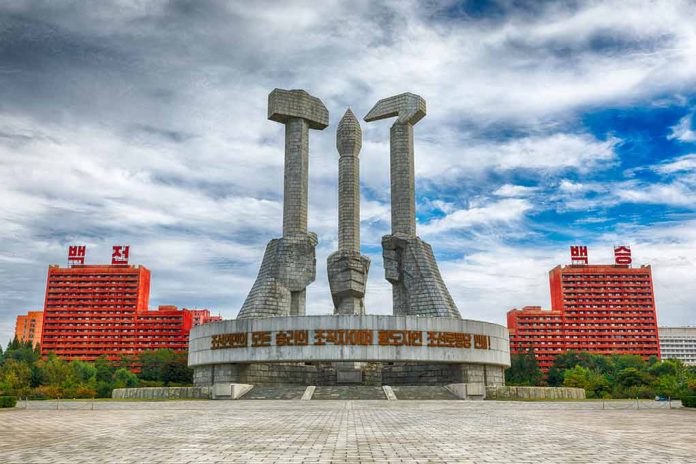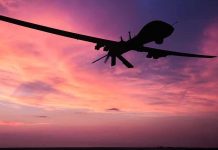
Russia and North Korea have formalized a comprehensive security alliance that promises significant geopolitical shifts, but questions linger about its impact on global stability.
At a Glance
- Russia and North Korea signed a treaty in June 2023, strengthening military ties.
- The treaty includes mutual military assistance if either is attacked.
- U.S., Japan, and South Korea condemn the treaty as destabilizing.
- North Korea’s ambitions include continued space program development.
Details of the Partnership
The strategic partnership treaty between Russia and North Korea was formalized in June 2023 by Russian President Vladimir Putin and North Korean leader Kim Jong Un. It includes a mutual defense clause, ensuring military support if either nation is attacked. This agreement marks the onset of enhanced military cooperation, raising concerns across international communities about regional stability in Northeast Asia.
This treaty also encompasses collaborative efforts in non-defense sectors. A critical provision aligns with Article 51 of the UN Charter, demanding immediate military assistance under attack conditions. Despite assertions from the Kremlin, describing the treaty as straightforward and thorough, the explicit details might lead to geopolitical tensions.
Japan, South Korea, and the United States have voiced strong opposition, labeling the treaty a potential destabilizer in the region. South Korea’s President Yoon Suk Yeol denounced the agreement, emphasizing the breach of existing UN Security Council resolutions. Yet, both Moscow and Pyongyang have denied allegations of arms exchange, maintaining focus on advancing their strategic military cooperation.
‘In effect indefinitely’: What does Russia-North Korea strategic partnership deal focus on?
The Korean Central News Agency has published the full text of the Comprehensive Strategic Partnership Agreement that was signed by Kim Jong Un and Vladimir Putin during the latter’s… pic.twitter.com/QVekjjNydz
— Sputnik (@SputnikInt) June 20, 2024
Technological and Military Ambitions
North Korea’s aspirations extend beyond traditional military cooperation. Despite a failed satellite launch in May 2023, the regime remains determined to enhance its space technology. The treaty potentially opens avenues for Russia to provide support for North Korea’s nuclear energy and space programs. While this collaboration may face challenges from UN sanctions, the Kremlin and Pyongyang appear committed to enduring partnerships poised to defy international restrictions.
As tensions rise on the Korean Peninsula, South Korea has conducted live-fire exercises near the inter-Korean maritime border, further aggravating the situation. Russia’s political maneuvers against South Korea supplying arms to Ukraine continue to influence the regional security landscape. Meanwhile, North Korea’s withdrawal from a 2018 inter-Korean military agreement exacerbates uncertainties around future peace prospects.
North Korea's mutual defense pact with Russia is an ominous warning to the West of what is to come: closer collaboration between dictators determined to win the 21st century.
Our alliance structure has kept the peace since WW2. Theirs brings us closer to war by the day. https://t.co/vAa8et1RiA
— Morgan Ortagus (@MorganOrtagus) June 19, 2024
Global Implications
The new alliance’s emergence highlights a shift in global geopolitical dynamics, unsettling the United States and its allies. Anticipations regarding Russia-North Korea collaborations extend to the exchange of high-end nuclear and missile technologies. The pact signifies a long-term commitment driven by shared opposition to Western dominance rather than ideological alignment.
As the partnership develops, experts encourage the U.S. and European allies to strategize collectively, possibly considering a joint defense framework. Such steps could involve seizing North Korean financial assets and identifying companies engaged in illicit military trade. While the full ramifications of the treaty remain to unfold, Russia and North Korea’s alliance demands strategic recalibration from the global community.
Sources:
- https://www.reuters.com/world/kremlin-says-its-mutual-defence-agreement-with-north-korea-is-unambiguous-2024-10-15/
- https://www.armscontrol.org/act/2024-07/news/north-korea-russia-strengthen-military-ties
- https://english.alarabiya.net/News/world/2024/10/15/treaty-with-north-korea-provides-for-strategic-cooperation-in-all-areas-kremlin
- https://www.csis.org/analysis/new-russia-north-korea-security-alliance
- https://www.npr.org/2024/06/19/nx-s1-5011768/russia-north-korea-treaty-mutual-defense
- https://www.cfr.org/expert-brief/russia-struck-defense-pact-north-korea-what-does-it-mean
- https://www.reuters.com/world/russia-north-korea-pact-includes-mutual-defence-clause-putin-says-2024-06-19/
- https://www.theguardian.com/world/article/2024/jun/19/russia-and-north-korea-sign-mutual-defence-pact
- https://www.apln.network/analysis/commentaries/russia-and-dprk-mutual-defence-pact-implications-for-northeast-asias-regional-security-dynamics
- https://www.kyivpost.com/post/40533










